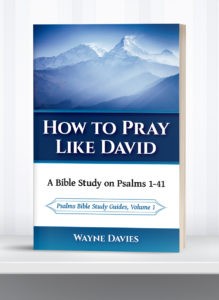 Jesus made some amazing statements.
Jesus made some amazing statements.
For example, He claimed to be God, and He did so repeatedly.
“I tell you the truth, before Abraham was born, I am.”
The Jewish religious leaders were so outraged at this blatant pronouncement of deity that “they picked up stones to stone him.” But it wasn’t time for Him to die, so “Jesus hid himself, slipping away” from their grasp (John 8:58-59).
Here’s another bold statement Jesus made to the religious establishment, men who spent years studying and teaching the Old Testament. “You diligently study the Scriptures because you think that by them you possess eternal life. These are the Scriptures that testify about me, yet you refuse to come to me to have life” (John 5:39-40).
“These are the Scriptures that testify about me.”
I think it’s difficult if not impossible for us to grasp just how radical this statement would have sounded to a first century Jew steeped in the traditions of ancient Judaism. Not only did Jesus claim to be God, He claimed to be the Messiah, the One spoken about throughout the Old Testament as “the anointed one,” the long-awaited King who would come to save His people from their enemies and establish the kingdom of God on earth. He was saying, in effect, that “I am the One prophesied by the prophets of old.”
And here’s one more audacious claim:
“I am the way and the truth and the life. No one comes to the Father except through me” (John 14:6).
This was an astonishing statement in any era. It was a hard pill to swallow 2,000 years ago. And it’s a hard pill to swallow today. In our age of religious tolerance, many people today find fault with such a narrow-minded perspective.
For orthodox Christians, however, it is one of our most treasured Scriptures. The purpose of this article is to explain the meaning of this verse and to see how it teaches the truth that reading the Bible should never be an end it itself. Rather, we read the Bible because it leads us to Jesus, and Jesus (God the Son) takes us to God the Father.
First, let’s get the context. Asking simple questions is a good way to see how any one verse fits into the bigger picture.
Who said this? Jesus. Who is he addressing? The apostles.
When and where did he say this? On the night before his crucifixion, Jesus and his disciples were celebrating the Passover meal in the Upper Room. This scene is also known as the Last Supper because it is Jesus’ final meal with his closest followers before being arrested, tried and killed on Good Friday.
Perhaps the most important question is: Why did Jesus say this? John 14:6 is Jesus’ answer to a question. More on that in a moment.
Jesus has been preparing the disciples for his departure. Note John 13:33, “My children, I will be with you only a little longer. You will look for me, and just as I told the Jews, so I tell you now: Where I am going, you cannot come.” Then in verse 36 Peter asks, “Lord, where are you going?” Jesus replied, “Where I am going, you cannot follow now, but you will follow later.”
Jesus knows that he will be crucified the next day and is doing his best to get the disciples ready for this. His inevitable death has been a topic of discussion during the final months of his 3-year ministry. Mark’s gospel records Jesus’ straightforward prediction. In no uncertain terms, Jesus has been telling them, “We’re going to Jerusalem, and I’m going to be killed there. And three days later I will rise from the dead.” (See Mark 8:31-33, Mark 9:30-32 and Mark 10:32-34.)
The disciples do not know what to make of this. Even though Jesus “spoke plainly” about it, on one occasion “Peter took him aside and began to rebuke him” (Mark 8:32). Their confusion is to be expected, of course, given all that Jesus has said and done in their presence. Mark provides insightful commentary on these exchanges: “But they did not understand what he meant and were afraid to ask him about it” (Mark 9:32).
So now we’ve come to the 13th hour in the Upper Room and Jesus once again brings up his departure. “In my Father’s house are many rooms . . . I am going there to prepare a place for you” (John 14:2).
Then Thomas says, “Lord, we don’t know where you are going, so how can we know the way?” (John 14:5).
Jesus answers this question with his famous words, “I am the way and the truth and the life. No one comes to the Father except through me” (John 14:6).
With our 20/20 hindsight, it’s easy for us to wonder about Thomas and his question. Jesus has just said, “I am going there to prepare a place for you” (John 14:2). Where is he going? To “my Father’s house” (v.2). And later he says, “I am going to the Father” (v.12).
But Thomas and his companions are like a deer caught in the headlights. They just don’t get it. Again, let’s not be too hard on them. Would we have reacted any differently?
In the midst of the apostles’ confusion, Jesus is presenting some of the most compelling and comforting teaching in the Bible. In a word, they are “troubled” (John 14:1). Their leader is telling them that he is leaving soon, and he is providing words to help them deal with the shock of his departure.
It is in this context that Jesus says “I am the way” to God the Father and the heavenly house that he inhabits. Much has been written and said about heaven. This passage contains one of the most beautiful descriptions of the Christian’s eternal abode – heaven is “my Father’s house” (John 14:2).
Is this not a wonderful metaphor? Think for a moment about this: If you are believer in Jesus Christ, you will live forever in your Father’s house! What is heaven like? For the Christian, it is home. It’s where you belong. It’s that one place where safety and security abound without measure.
Reflect on the many pleasant characteristics of your own home, and multiply that description by infinity, and you’re now getting a picture of what heaven will be like. Breathtaking, isn’t it?
And what makes it all possible? It is the house of God. It is the presence of the Lord Almighty, Creator of heaven and earth, that makes heaven such a glorious place. When we ponder the delights of eternity, this should be our focus, because this was Jesus’ focus.
Jesus said, “I am the way.” The way to where? “I am the way . . . No one comes to the Father except through me” (John 14:6). And a few sentences later he says, “I am going to the Father” (John 14:12). For Jesus, going back to heaven meant going back to the Father.
Ah, but there’s more!
Jesus also says that the way to the Father is “through me” (John 14:6). Jesus was leaving the apostles, but this separation was temporary. He promised to come back and “take you to be with me that you may also be where I am” (John 14:3).
Heaven is not only our Father’s house, it is also the place where Jesus will live forever. When we go to heaven, we are going to live with the Father and the Son. Could there be a more precious promise in all of Scripture than this!
Scripture abounds with mind-boggling descriptions of heaven. It is a home unlike any we’ve experienced on earth. It is a place where “There will be no more death or mourning or crying or pain” (Revelation 21:4). We can only imagine the glory of heaven! It is so glorious that the apostle Paul was “caught up to Paradise” but not allowed to talk about it. “He heard inexpressible things, things that man is not permitted to tell” (2 Corinthians 12:2-4).
But heaven is our hope. And so we should think about it, long for it, and serve God patiently while waiting for it.
Jesus’ comments about heaven remind me of a question I first heard in a John Piper sermon: “Why do you want to go to heaven?”
I had never thought of such a question before. What is my motive for going there?
Imagine you could go to heaven and receive all the promised benefits. No more sickness or death. No more suffering. No more sorrow. You get to live forever in a perfect environment, with all the comforts of home multiplied a million times.
You get to experience everything the Bible says about heaven, with one exception. Jesus is not there.
Do you still want to go?
If Jesus is not in heaven, do you still want to go to there?
Think about it today. And examine yourself in the light of John 14:3. “If I go and prepare a place for you, I will come back and take you to be with me that you may also be where I am.”
When Jesus talked about heaven, the emphasis was being with him. That is the main attraction of heaven — Jesus. Should that not be our main reason for desiring heaven? May it be so.
May we say with Paul, “I desire to depart and be with Christ, which is better by far” (Philippians 1:23). May we long for heaven because we long to be “at home with the Lord” (2 Corinthians 5:8).
NOTE: This blog post is an excerpt from the book, Top 10 Reasons to Read the Bible Today, by Wayne Davies. The Kindle version is available for free on Amazon.








